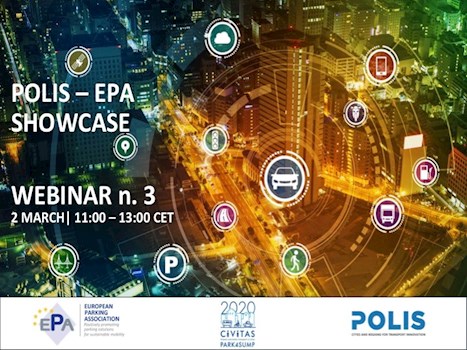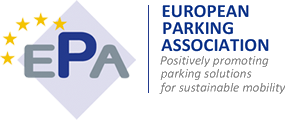Third EPA-POLIS Webinar
POLIS, the European Parking Association (EPA) and PARK4SUMP convened to discuss digitalization and the parking eco-system. Here is all you need to know about the webinar!
Think you know parking? Think again! From electric vehicles to shared mobility services and multi-modal transit hubs, our urban transport landscape is transforming rapidly, driven by new technologies, fuels and public-private partnerships.
Parking has been at the helm of this revolution as integrated payment systems, digitalised permits, autonomous surveillance infrastructure and new routing services have facilitated and enriched new and sustainable modal offerings.
But how can we ensure momentum continues? As air quality and modal shift targets loom large, never before has the need for a more flexible curbside been so imperative; and parking will play a critical role in this.
To explore the way forward, POLIS, EPA and PARK4SUMP convened for the 3rd installment of their joint webinar series to discuss the digital technologies and data management solutions which are transforming on-street parking.
View the full recording HERE
With a packed agenda and over 250 registrants, this webinar traversed the web of applied digital solutions that are enabling integrated management solutions. We heard from industry leaders, non-profit sector organisations and local authorities to understand the concepts and technologies propelling recent developments in parking management.
“We are here to understand the immense capacity for technology to improve our parking landscape. We are seeing a convergence of previously isolated aspects of parking management,” said Nigel Williams, of Parking Matters, introducing the webinar.
What is the future of parking: Looking into the crystal ball ![]()
New technologies, as well as Covid-19, have accelerated digitalisation trends in parking.
“It is surprising how many people still struggle with parking services, it is a big challenge to make it as connected and accessible as possible- but there are a range of exciting opportunities” said Thomas Pühringer from Ski Data.
EV-charging facilities, contactless payments and routing have seen dramatic improvements, and Pühringer predicted that these would soon become the mainstay of parking operations.
“Technology is at this point now!” he asserted.
However, he emphasised the necessity to continue to offer a good balance of digital payment and booking options and ‘old-world’ means during this transition phase to ensure parking is as accessible as possible.
He stressed the need to integrate digital platforms and tariffs to accommodate customer demands- as B+B Parkhaus GmbH, Germany and Stavanger Parkering, Norway are doing.
In many situations, such as POLIS member, Amsterdam, on-street and off-street payment systems are also being integrated, pursuing a single common platform for seamless and digital parking for inhabitants and visitors.
On-street parking & curb side management tools ![]()
The days of slotting coins into a dodgy parking meter and chasing your paper ticket through the windy city streets are numbered! Today’s on-street parking is undergoing a revolution; from app-based payments to new routing services.
Thierry Brusseaux from FLOWBIRD described how omni channel user interfaces are being used to manage the allocation and payment of the curbside use for an accessible and inclusive city. FLOWBIRD is a software platform which helps local authorities to measure, monitor and manage traffic flows and parking, working with open payments and account-based ticketing.
“In France, more than 90% of parking terminal have been retrofitted or replaced to ensure digital capacities” Brusseaux said.
FLOWBIRD are also looking at integrating parking and MaaS interfaces, combining shared mobility and parking services.
From mismanagement to seamless flows: Parking made easy ![]()
For many cities, inefficient pricing, lack of data, congestion and search times are costly, polluting and time consuming. Better data offers a solution for matching supply and demand.
“Our parking is currently being mismanaged, and it is a key asset which we cannot afford such inefficiency,” asserted Morten Hother Sørensen presenting EasyPark’s parking inventory and occupancy tool. EasyPark Group operates in 25 countries across more than 3,200 cities
Indeed, according to a INRIX study, drivers in London spend an eyewatering 67 hours a year searching for a spot, costing them £1,104 each in wasted time, fuel and emissions and the city as a whole £4.3 billion.
The new occupancy tool helps cities understand parking demands and match this with effective regulation.
Peter Dingemans from Dingemans Management B.V. discussed the new applications and technologies for (dynamic) occupancy information.
“We need to take a leading role in helping cities reduce CO2 emissions and manage traffic,” said Dingemans.
“However, the level of integration is currently low, and data use is not where it should be.”
Dingemans shared some key advice for those embarking on new ways of managing parking in a dynamic way, including:
- Define requirements in line with your parking policy and objectives
- Include multi-channel communication
- Secure access to (open) dynamic parking data & interoperability
- Include connectivity with open parking data standards
- Assure data security and data privacy (GDPR)
- Evaluation of solutions on TCO basis
What are the cities doing?
Sint- Niklaas puts parking first ![]()
The webinar then headed to the Belgian city of Sint-Niklaas to find out about some innovative new tools for parking management. The city is one of the Park4SUMP follower cities, and through the project is placing parking management as part of a wider strategy for freeing up public space, supporting local businesses, reducing search travel, generating revenues, and making the city more attractive.
Stefan van den Branden presented the city’s plan for improving safety and liveability by avoiding cruising and searching for parking, by shifting on-street to off-street parking. Indeed, the vision for Sint- Niklaas’s main square is a significant transformation from a car park to a green public space.
“We are segregating parking, creating zones which allocate parking according to the times visitors stay, and run many services online,” van den Branden reported.
“We are also trying to change users’ mind-set encouraging them to park further from their final destination, combining parking with shared mobility and public transport.”
However, the city’s dynamic parking system still requires updating in order to ensure it fulfils mobility management demands, and upcoming procurement will include ways to measure, monitor and evaluate traffic flows, congestions, travel time and parking occupancy.
Becoming a digital operator: Do you have what it takes? ![]()
Then the webinar travelled to the German city of Mainz, part of the (POLIS member) FrankfurtReinMain region. The city is a major transport hub and home to the fifth largest inter-modal port in Germany, it is an important component in European distribution and logistics.
The city is also undergoing a parking transformation, and the webinar heard from PMG Parken in Mainz, who operate over 10,000 parking spaces and 25 carparks, about the recent tech driven changes.
Christian Grzona from Evopark (the city’s long-term partner) presented on behalf of Parken in Mainz how the PMG organisation is adapting new rapidly changing parking demands with their Park&Go app, 24/7 operation central control room, high safety and usability standards and comprehensive staff training.
In Mainz, parking is being treated as part of the urban landscape, not a separate, isolated entity, with Park & Ride Solution- providing free public transport for PMG users, opening bicycle parking- as well as access to discounted events and services across the city.
Grzona stressed the importance of cooperation with municipalities and public services when adapting to new regulations and sharing data on occupancy and tariffs.
Parking Data Standards: The key to integration? ![]()
Creating integrated parking solutions requires securing good data. This is a topic POLIS has discussed widely, and a conversation which demands strong cross-sector collaboration- so what better forum than the POLIS-EPA joint webinar!
The quantity and quality of mobility data is rapidly growing, and it has the potential to reduce the size and complexity of tender specifications, reduce costs and drive ambition and innovation.
Keith Williams from the Alliance for Parking Data Standards (APDS), joined the panel to deliver an overview of the how data is being leveraged to improve parking across Europe. APDS is a not-for-profit organization with the mission to develop, promote, manage, and maintain a uniform global standard that will allow organizations to share parking data across platforms worldwide.
“This is a dynamic standard, that continues to be updated as new demands arise,” said Williams.
He also warned against using the wrong standard which risks lack of adoption by sector and non-compliance by suppliers.
What is next? The 20th EPA International Parking Congress in Brussels ![]()
The 2022 Congress- and the EPA’s first CO2 neutral event- will be taking place from the 12-14 September. The theme is “The EU Green Deal and the Future of Parking – Integrated solutions for Dynamic Urban Management”.
Their past events have attracted over 500 delegates- operators in the parking industry, national and local public administrations, representatives of European Commissions and Projects, experts in the field of mobility, urban logistics, electrical mobility, the data world, ITS, Apps and more.
3rd EPA-POLIS Webinar Program
Digitalization and the Parking Eco-System - Equipment and Devices
Moderators – Nigel Williams & Ivo Cré
Session 1
11:00 - 12:00
1. Connected Parking and Mobility solutions – Trends: Thomas Pühringer, SKIDATA
2. On-Street Parking & Curb side Management Tools: Thierry Brusseaux, Flowbird
3. An overview of the Parking Eco System: Morten Hother Sørensen, Easy Park
4. Optimising Space Occupancy: Peter Dingemans, Board Member EPA
Discussion (Q&A)
Session 2
12:00 - 13:00
1. Tools for a better Parking Management: Stefan Van den Branden, Sint-Niklaas
2. City of Mainz – becoming a digital Parking Operator: Nils Teske, Uwe Brück, Kim Schreiber, PMG Mainz – Presenter: Christian Grzona, Evopark
3. Parking Data Standards – Key to integration:- Keith Williams, Alliance for Parking Data Standards
Discussion (Q&A)
Coming up - 20th EPA International Congress and Exhibition - 12° - 14° September 2022 – Brussels: Laurence A.Bannerman, President EPA
Information about the Speakers
Nigel Williams
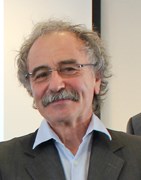
CV:
Nigel Williams is a well-known parking expert and industry thought leader. He is Chair of the British Parking Association (BPA) and the International Alliance for Parking Data Standards (APDS. He also chairs the Smarter Parking Group of the UK government’s Department for Transport’s Technology Forum whose primary role is to provide guidance to local authorities on industry innovation and best practice. Nigel is Managing Director of Parking Matters. He received a Lifetime Achievement Award at the British Parking Awards in 2019.
Ivo Cre
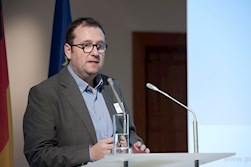
CV:
Ivo is involved in Polis’ policy coordination and activities of EU project development. He leads Polis' thematic pillar on the Social and Economic Aspects of Transport. Ivo coordinates the Polis working groups on parking and on financing and has coordinated Polis’ policy paper on smart cities. He is currently working on the European Projects Future Radar, CIVITAS SATELLITE, SETRIS, EBSF_2 and SUNRISE. Ivo has extensive experience in city networks and policy in the field of mobility.
Thomas Pühringer

CV:
Thomas is a digital technology enthusiast and business leader with a passion for simple and elegant solutions that provide tangible benefits for people. Between 2000 and 2012 he gained extensive Experience in the Software as a Service and eCommerce Business in Senior UX and Product Management leadership roles at Sony Europe and RealNetworks (Seattle, WA). His first encounter with the Parking Business was in 2013 working for Commend International as Head of Product Management. In 2017 Thomas joined SKIDATA and is now driving the future of Parking as the Director of the Business Line Parking.
Abstract of Presentation:
In his presentation at the EPA POLIS Webinar Thomas will highlight the Challenges as well as Opportunities arising from new Technological Evolutions in context of Parking and Mobility use cases. His belief is that digitization and the ability to connect previously isolated solutions with each other can significantly contribute to making cities more live-able, visitor experiences more pleasant and parking and mobility businesses more efficient and profitable.
Thierry Brusseaux

CV:
Thierry Brusseaux, Engineer from INSA Lyon, held various positions in R&D, Sales and Marketing at Schlumberger, Parkeon and then at Flowbird in the Transport, Parking and Smart City Business Units. In an international context, Thierry Brusseaux has developed expertise in urban mobility and ticketing applied to parking and public transport. He currently is the Marketing and Alliance Director for France at Flowbird.
Abstract of Presentation:
Extension of urban areas, development of internet sales increase people mobility and delivery needs. New clean, shared, connected mobility solutions are developing but all of them need to use the curbside. On Street Parking payment and control infrastructure (parking terminals, mobile payment apps, permits, PDAs, Scancars...) manage the allocation and payment for the use of the curbside to park individual cars. Digital Parking already allocates the right to use the kerb depending on the type of vehicle (clean, shared...) and the profile of the driver (resident, professional, visitor, disabled...) with respect to the defined parking policy. Thanks to digital solutions with open architecture to facilitate integration, Parking management solutions are available to give to cities the ability to manage and control the curbside for all uses, including new mobility schemes and last mile delivery.
Morten Hother Sørensen

CV:
Morten Hother Sørensen is Chief Distribution in Easypark Group, the market leader in mobile paid parking services. Morten has been with Easypark group for for 11 years. Before Easypark Morten had management positions in the FMCG and telecommunication industry. Within Easypark Morten has been one of the main drivers for building Easyparks footprint across Europe to count more than 20 countries.
Abstract of Presentation:
The parking ecosystem is becoming fully digitalized. With digitalization comes transparency and the ability to analyze and optimize parking policy efforts in favor of either political or financial ambitions All governed by understanding the nature of the supply side with the parking inventory, and the demand side featuring the modern urban motorist. A short presentation of the design and logic of the emerging parking ecosystem will be presented.
Peter Dingemans:
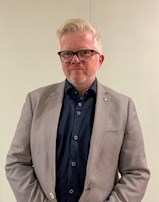
CV:
Peter Dingemans is a board member of the EPA, the European Parking Association and Vice President of Vexpan, the Dutch Parking Association. As EPA-board member he is also chairing the EPA working group reviewing the European Standard Parking Award Off-Street (ESPA Off-Street) criteria. Peter is active in various areas within the international world of parking and mobility. With over 20 years of experience in the parking industry, Peter is implementing his activities through Dingemans Management B.V. and a partnership with Monit, a market leader in parking data processing and Spark, a leading parking consultancy firm in The Netherlands. As a parking professional for renowned parking companies, Peter has contributed in leading positions to building organisations and the introduction of innovative parking solutions.
Abstract of Presentation:
With the changing role of parking in relation to current parking policies and the objectives to make cities more livable, it is important to be able to monitor the real-time occupancy of parking spaces in city centers and thus to be able to control parking behaviour. The availability of dynamic parking data is important for motorists and parking operators from different perspectives. This contribution briefly summarizes the various aspects around this topic.
Stefan Van den Branden

CV:
Stefan has a strong affinity with the city of Sint-Niklaas and its mobility challenges. After working on the bicycle policy for several years, he became the parking enforcement coordinator in 2016. Knowing the city’s main problem areas, Stefan now advises the city council and tries to find solutions for all parking issues in Sint-Niklaas.
Abstract of Presentation:
Sint-Niklaas is a rather small Belgian city near Brussels and Antwerp. Recently the city has reached a new milestone: 80.000 inhabitants. In the past parking wasn’t a priority, but that has changed! With a growing population the challenges have increased. Which tools can a smaller city use to measure, control and improve its parking management? What has the city of Sint-Niklaas done so far and how will they try to make their parking management future proof? A brief insight.
Nils Teske
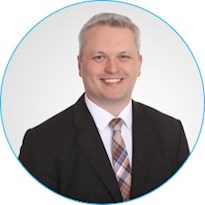
CV:
Nils joined PMG Parken in Mainz GmbH in 2014 and was jointly responsible for all commercial activities. Since 2019, he has been one of the company's two managing directors. Nils studied economics after completing his apprenticeship as a banker. After studying real estate economics, he completed the Executive MBA in General Management program in St. Gallen, paving his way to becoming a managing director. As an accomplished finance professional, banker and economist, Nils loves numbers, statistics, Excel as well as digital advancement and is enthusiastic about the technical progress at PMG.
Uwe Brück

CV:
Uwe has been with PMG Parken in Mainz GmbH since 2000. Thus, he was responsible for the technical operation of the parking garages as technical manager until 2021. With over 20 years of experience as a technical manager, Uwe provides the necessary know-how in the urban parking environment. After completing his training as an industrial master electrician specializing in operating and power engineering in 1991, Uwe worked in the area of plastics processing as a production and operations manager.
Kim Schreiber

CV:
Kim joined the parent company of PMG Parken in Mainz GmbH in 2002 as an apprentice and was taken on as a commercial clerk in PMG administration in 2005. For the past ten years, Kim has been a team leader in PMG administration and is jointly responsible for all commercial activities here. Kim is the contact person for the commercial processing of the long-term parking area and is in close exchange with evopark.
Christian Grzona

CV:
At evopark, Christian coordinates the international direct and channel sales activities with focus on the D-A-CH region, BeNeLux, UK and the US. He joined the team beginning of 2020. Until end of 2019 he was Director Business Development (Real Estate) at Scheidt & Bachmann’s Parking Solutions Division. His focus was on building relationships with key decision makers within large cross-border operating property development firms and REIT’s to assist in building their mobility product of the future. Until May 2019 Christian was Regional Manager Asia/Pacific and was responsible for the channel management, key account management and business development in the region. He started his career in 2008 as Sales Representative for DESIGNA and joined Scheidt & Bachmann in November 2012. Christian Grzona studied International Business & Languages with major in Marketing Communication and Export Management and graduated as Bachelor of Commerce (BCom) in 2008.
Abstract of Presentation:
The PMG Parken in Mainz GmbH has 40 years of experience in the management and operation of a city-wide network of car parks. Throughout the years they coped with the ever-changing demands of mobility through their flexible operational structure. A network of strong, trusted and experienced partners, continuous training of staff, a steady re-assessment of processes, as well as focus on state-of-the-art technology are their key factors for success.
Keith Williams
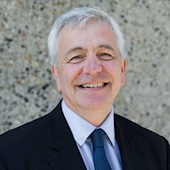
CV:
Keith is a parking data and systems expert and has been an innovator in the field of payment systems and parking technology solutions for over 20 years. He is a member of the Board of Directors of the Alliance for Parking Data Standards (APDS) and the APDS’ Technical Steering Committee. He has led on use case production in the development of the APDS specifications. He is a designated parking expert to ISO by BSI (British Standards Institute), contributing to APDS’ adoption as ISO standard TS 5206-1. Keith is the Parking Matters lead for the UK National Parking Platform.
Abstract of Presentation:
Digitising parking management brings many benefits for municipalities, however, to be successful it requires the various systems to communicate and interoperate. This can be a challenge, especially when each of the systems has its own way of communicating that is not compatible with others. The APDS standards define an open structure for communicating parking and curbside related data, as well as common terms, messaging formats and even units of measurement. Using the APDS standards simplifies procurement, ensuring that interoperability requirements are clearly defined without the need to create pages of detailed specification. Keith will describe the APDS/ISO TS 5206-1 standard for parking and how it helps municipalities deliver parking and mobility services that meet their policy objectives.
Laurence A. Bannerman
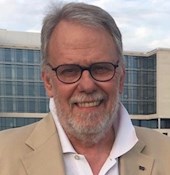
CV:
Laurence Bannerman, an architect and an international expert on parking development and management, urban mobility and urban revitalization projects with more than thirty-five years’ experience in the sector. He held important positions in both the public and private sectors of the parking industry amongst which the first Director of the Parking Division of S.T.A. Spa. (the mobility authority of the city of Rome) implementing and managing the public parking system and Director of Business Development and the Urban Systems division in Saba Italia Spa. He is the President of EPA, the European Parking Association since 2015, Chair of the EPA Scientific and Technical Committee, Secretary General of the Italian Parking Association AIPARK and a parking and mobility consultant.
EUROPEAN PARKING ASSOCIATION – 20TH INTERNATIONAL CONGRESS AND EXHIBITION
EPA celebrates 38 years of activity and represents the national associations of 23 countries and their 41 million on and off-street parking spaces, almost 500 thousand professional employees.
The 2021 Congress theme is “The EU Green Deal and the Future of Parking – integrated solutions for Dynamic Urban Management” and will be to date the most complete and multidisciplinary event involving operators in the parking industry, national and local public administrations, representatives of European Commissions and Projects, experts in the field of mobility, urban logistics, electrical mobility, the data world, ITS, Apps and much more. We will be examining the overall parking and urban mobility situation in Europe enabling us to address wider issues of urban mobility alongside detailed parking matters.
The EPA Congress combines a well-attended scientific conference with a trade exhibition for the parking and mobility industry. The recent events have seen an average presence of over 500 delegates, 50 top-level national and international speakers and 80 exhibitors from 32 countries worldwide.
EPA is positively promoting parking solutions for sustainable mobility.
